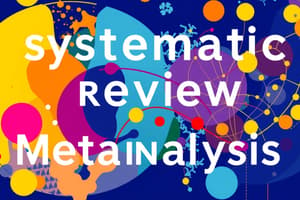Podcast
Questions and Answers
What aspect of study design is emphasized for the effectiveness of crisis houses in psychosis management?
What aspect of study design is emphasized for the effectiveness of crisis houses in psychosis management?
- Case-control studies
- Qualitative assessments
- Randomised controlled trials (correct)
- Observational studies
What is one of the components that should be included in the study eligibility criteria based on the PICOS framework?
What is one of the components that should be included in the study eligibility criteria based on the PICOS framework?
- Intervention duration
- Sample size
- Population characteristics (correct)
- Funding sources
Which process is NOT recommended for screening papers during a systematic review?
Which process is NOT recommended for screening papers during a systematic review?
- Assessing titles and abstracts first
- Reading only the full papers (correct)
- Following a pre-established process
- Involving multiple raters if possible
Which of the following is a source of grey literature to be considered in systematic reviews?
Which of the following is a source of grey literature to be considered in systematic reviews?
What search strategy component is crucial for replicability in systematic reviews?
What search strategy component is crucial for replicability in systematic reviews?
Which database is known for a broad range of bioscience research?
Which database is known for a broad range of bioscience research?
Which of the following methods is NOT typically used to combine search terms?
Which of the following methods is NOT typically used to combine search terms?
What is an example of an outcome that should be reported in studies of crisis houses?
What is an example of an outcome that should be reported in studies of crisis houses?
What is the primary purpose of conducting a literature review?
What is the primary purpose of conducting a literature review?
What is one of the main advantages of conducting a systematic review?
What is one of the main advantages of conducting a systematic review?
Which of the following best describes a meta-analysis?
Which of the following best describes a meta-analysis?
What does the PRISMA guidelines ensure in systematic reviews?
What does the PRISMA guidelines ensure in systematic reviews?
What is a significant limitation in conducting systematic reviews?
What is a significant limitation in conducting systematic reviews?
What is the first step in designing a systematic review?
What is the first step in designing a systematic review?
What issue can arise from data manipulation in systematic reviews?
What issue can arise from data manipulation in systematic reviews?
How can a systematic review guide clinical decision-making?
How can a systematic review guide clinical decision-making?
Which study design is specifically mentioned as appropriate for evaluating the clinical effectiveness of interventions?
Which study design is specifically mentioned as appropriate for evaluating the clinical effectiveness of interventions?
What is one of the key components that should be included in defining a search strategy for a systematic review?
What is one of the key components that should be included in defining a search strategy for a systematic review?
What type of literature is referred to as 'grey literature'?
What type of literature is referred to as 'grey literature'?
In formulating the search terms, which technique is used to include variations in spellings?
In formulating the search terms, which technique is used to include variations in spellings?
What should a systematic review's data extraction process ideally involve?
What should a systematic review's data extraction process ideally involve?
Which of the following outcomes would be appropriate to measure in studies regarding crisis houses?
Which of the following outcomes would be appropriate to measure in studies regarding crisis houses?
What does the term 'PICOS' stand for in the context of study eligibility criteria?
What does the term 'PICOS' stand for in the context of study eligibility criteria?
Which guideline provides internationally recognized standards for conducting and reporting systematic reviews?
Which guideline provides internationally recognized standards for conducting and reporting systematic reviews?
What is one of the benefits of conducting a systematic review?
What is one of the benefits of conducting a systematic review?
What does pooling results in a meta-analysis achieve?
What does pooling results in a meta-analysis achieve?
Which aspect of systematic reviews is crucial for transparency in the research process?
Which aspect of systematic reviews is crucial for transparency in the research process?
Which limitation refers to the underrepresentation of negative research findings in publications?
Which limitation refers to the underrepresentation of negative research findings in publications?
What is a key component in developing inclusion and exclusion criteria in a systematic review?
What is a key component in developing inclusion and exclusion criteria in a systematic review?
What potential issue arises from differences in types of included studies in a systematic review?
What potential issue arises from differences in types of included studies in a systematic review?
Which action can improve the quality and visibility of data in systematic reviews?
Which action can improve the quality and visibility of data in systematic reviews?
Why is it important to consider the timing and cultural context of studies included in a systematic review?
Why is it important to consider the timing and cultural context of studies included in a systematic review?
Flashcards
Systematic Review
Systematic Review
A comprehensive and repeatable process of gathering all relevant evidence on a research question. It traces all relevant evidence and systematically analyzes it, aiming to minimize bias in the synthesis.
Meta-analysis
Meta-analysis
A statistical method that combines data from multiple independent studies to arrive at a more powerful conclusion. It increases the statistical power to detect real effects and reduces uncertainty.
Publication Bias
Publication Bias
Bias due to selective publishing of studies. Studies with positive findings are more likely to be published than studies with negative or inconclusive findings.
PRISMA Guidelines
PRISMA Guidelines
Signup and view all the flashcards
PICOS Framework
PICOS Framework
Signup and view all the flashcards
Literature Review
Literature Review
Signup and view all the flashcards
Evidence Synthesis
Evidence Synthesis
Signup and view all the flashcards
Data Invisibility
Data Invisibility
Signup and view all the flashcards
Research Question and Search Strategy
Research Question and Search Strategy
Signup and view all the flashcards
OVID Database Platform
OVID Database Platform
Signup and view all the flashcards
Grey Literature
Grey Literature
Signup and view all the flashcards
Defining Search Terms
Defining Search Terms
Signup and view all the flashcards
Boolean Operators
Boolean Operators
Signup and view all the flashcards
Research Question
Research Question
Signup and view all the flashcards
OVID
OVID
Signup and view all the flashcards
Study Notes
Systematic Reviews and Meta-Analyses
- Synthesize existing research to answer a specific question.
- Offer a comprehensive and reproducible approach to searching and evaluating evidence, minimizing bias.
- Improve clinical decision-making and guidelines by summarizing available data.
- Meta-analyses combine results from multiple studies to increase statistical power and strengthen conclusions.
- A systematic review is a comprehensive and reproducible search, tracing all relevant evidence, and examining all types of data, not just randomized controlled trials.
- A literature review summarizes previous academic work on a research question.
Benefits of Systematic Reviews & Meta-Analyses
- Comprehensive data synthesis avoids subjective biases and missed evidence.
- Pooling data enhances clarity of findings and improves treatment decisions.
- Provides robust support for treatments, showing clear indications of success.
- Makes evidence accessible, allowing assessment of what is known and not known.
- Can guide clinical decision making and guidelines, leading to more powerful analyses when meta-analysis is possible.
Limitations of Systematic Reviews & Meta-Analyses
- Publication bias is a significant concern; negative findings are often underrepresented.
- Language limitations may exclude research from non-English speaking countries.
- Data manipulation issues and flawed analysis might compromise the review's validity.
- Variable study characteristics and methodologies in included studies can weaken overall conclusions.
- Negative conclusions might indicate a treatment doesn't work, evidence lacks an effect (due to small numbers or poor quality studies), or important effects may not be measured.
- 50% of trials might not be published, reflecting data invisibility and the stakeholders' interest in non-publication.
Steps in Designing a Systematic Review
- Define a precise research question.
- Adhere to PRISMA guidelines for reporting.
- Establish inclusion/exclusion criteria (PICOS) – population, intervention, comparator, outcomes, study design.
- Identify relevant sources & dates.
- Design a search strategy, using databases like Medline, Embase, Web of Science, Cochrane Library, etc.
- Screen papers for eligibility (title/abstract, full text).
- Extract and analyze data, assessing data quality and bias risks.
- Synthesize findings, considering meta-analysis possibilities.
- Register the protocol and adhere to reporting standards.
- Specify your sources (databases, grey literature, research registries), language, and date ranges.
- Decide on a screening process for papers (titles and abstracts, then full papers; multiple raters if possible).
- Specify data to extract, how to store and process it, and how to synthesize studies (meta-analysis, summary, quality rating tool).
- Register your protocol in a registry like PROSPERO.
Search Strategy Development
- The research question directly informs the strategy: database selection, keywords, and limits.
- Broad, encompassing searches are preferred.
- Transparency for reproducibility is crucial.
- Utilize Boolean operators (AND, OR, NOT) and truncation (*) for keyword variations.
- Search terms and phrases encompassing key concepts are necessary for comprehensive coverage.
PRISMA guidelines
- Provide standardized procedures for systematic review conduct and reporting.
- Enhance rigor and transparency by covering research questions, eligibility criteria, sources, and reporting steps.
- Maintain high quality research, enabling others to understand the methodology.
Databases
- Multiple academic databases exist (e.g., Ovid, PubMed, Web of Science, Embase, PsycINFO, CINAHL, Cochrane).
- Different databases suit different research specialties.
Grey Literature
- Includes supplementary data sources beyond academic publications like conference papers, PhD theses, and campaigning organization reports.
- Provides a broader perspective, including evidence not in standard databases.
Defining Search Terms
- Specify keywords and phrases for comprehensive coverage, relating to the research question and key concepts.
- Include terms from the intervention, participants, types of studies, and outcomes.
- Appropriate Boolean operators and truncation enhance results.
- Use inverted commas to search whole phrases and truncation (*) for variations in spellings.
- Combine terms using Boolean operators for precision and scope.
Studying That Suits You
Use AI to generate personalized quizzes and flashcards to suit your learning preferences.
Description
This quiz explores the principles of systematic reviews and meta-analyses, highlighting their importance in clinical decision-making. It examines the benefits, limitations, and methodologies used to synthesize research evidence effectively. A must-know for anyone interested in research methodology and evidence-based practice.




